R. Mark Liebenow's Blog: Nature, Grief, and Laughter, page 4
May 14, 2017
Of Mountains and Bone
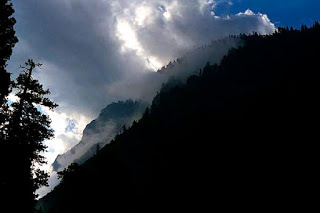 Turtle Island Quarterly
Turtle Island Quarterly My nature poem “Of Mountains and Bone.” Inspired by Ansel Adams’ black and white photograph - “Tetons and the Snake River.” It’s the fourth poem down.
(The photo with this announcement is not of the Tetons, but it gives you a nature scene to look at. Do check out Adams’ stunning photo.)
www.fourdirectionpoetry.wixsite.com/turtleisland/12-3-1
Published on May 14, 2017 18:26
March 5, 2017
Sitting On Porches
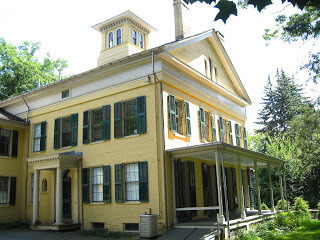 In small towns, like the one I grew up in Wisconsin, as well as in the older neighborhoods of large cities, there are still old houses with porches. Often they are close enough to the sidewalk that people walking by can talk to the people sitting there. Porches are also good for writing.
In small towns, like the one I grew up in Wisconsin, as well as in the older neighborhoods of large cities, there are still old houses with porches. Often they are close enough to the sidewalk that people walking by can talk to the people sitting there. Porches are also good for writing.In the summer, in the time before air conditioners and cable TV, people would come out to their porch after dinner to cool down, put their feet up, and talk until it became too dark to see each other’s faces — how everyone’s day went, who was having surgery tomorrow, who was in town visiting relatives, and what did everyone think about the plan to build a new school?
Sitting on the porch, they listened to the birds chatting in the darkening trees, watched the yellow sun set over the horizon and, as the clouds cleared from the sky, they felt the air grow cool and saw the stars begin to emerge. If heat from the day is lingering, maybe they’re drinking iced tea, lemonade, mint juleps or beer to cool down. If dark clouds were moving in with rain, they talked about that, and how the farmers would be pleased.
Porches are friendly places. They invite social interaction. Houses today aren’t built with porches. Subdivisions often don’t have sidewalks, and front yards are so large that people walking by can only wave across the distance. Most people stay inside, away from the mosquitoes, and don’t know the people who live two houses down. Even in our own neighborhoods we don’t feel part of a living community. If we are struggling with an illness, loneliness or depression, we try to be strong on our own.
I live in a large city now, and after dinner I pretend that I’m working in the yard just so I can say hello to people walking by. Sometimes we talk for a time and get a sense of each other’s lives, and how, no matter how different, we are still so much the same.
Published on March 05, 2017 09:32
February 19, 2017
Bouillabaisse Against Bullies
Today I celebrate bouillabaisse! A fish stew from Marseille. The broth made of leeks, onions, tomatoes, celery, and potatoes.
I serve it with rouille – a mayonnaise of olive oil, garlic, saffron from India, and cayenne pepper from Asia.
I dip grilled slices of thick, hearty bread into the rich sauce full of the flavors of the world that make the tongue dance, the belly sing, and the heart purr like a tiger.
No pasty white bread without flavor, nutrition or fiber.
Marseille is where they sing the song that calls the community to rise up and resist the bullies.
I serve it with rouille – a mayonnaise of olive oil, garlic, saffron from India, and cayenne pepper from Asia.
I dip grilled slices of thick, hearty bread into the rich sauce full of the flavors of the world that make the tongue dance, the belly sing, and the heart purr like a tiger.
No pasty white bread without flavor, nutrition or fiber.
Marseille is where they sing the song that calls the community to rise up and resist the bullies.
Published on February 19, 2017 07:09
February 5, 2017
Quiche of Liberty
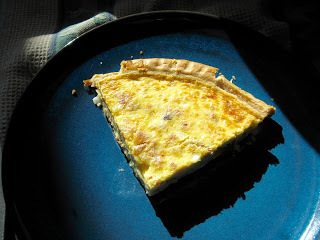 Today I eat the quiche of Liberty. The Statue is French and so is the food, via Germany. Both are immigrants, like most of our ancestors.
Today I eat the quiche of Liberty. The Statue is French and so is the food, via Germany. Both are immigrants, like most of our ancestors.I eat the quiche of liberty so that we may eat cheese and worship as we please.
I eat the quiche of liberty that we may live unfettered by racism, sexism, and the tyranny of self-serving rich politicians.
I eat the quiche of liberty with the huddled masses of the Emma Lazarus – with bacon, cheese, onions, mushrooms, spinach, and Gruyere, all held together in the crust of community.
I eat the quiche of liberty and believe there is enough to eat if we cut slices for each other and share.
Published on February 05, 2017 16:45
February 4, 2017
Apple Pie of Freedom
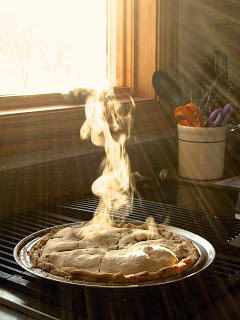
Today I eat an apple pie of freedom. Not that freedom is here, but pie helps me forget for a moment my despair.
I eat a pie of freedom because the desire exists that one day freedom will come for all of us.
I eat a pie of freedom, because fascists, oligarchs, and power-hungry men will not win in the end.
I eat a pie of freedom, because caring for the suffering of others is never wrong.
I eat a pie of freedom because life is more than the falsehoods, half-truths, and made-up lies that people spread about everyone who is not like them.
Today I eat a pie of freedom so that one day we may all sit down and eat pie together — apple, cherry, pumpkin, lemon cream custard — and we will ask how the other is doing, and we will listen.
Next week I shall eat quiche.
Published on February 04, 2017 19:39
December 18, 2016
Slow Me Down
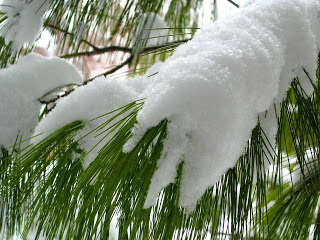 I come to this season wanting to soak up its atmosphere. I come to be moved and surprised in simple, yet subtle, ways.
I come to this season wanting to soak up its atmosphere. I come to be moved and surprised in simple, yet subtle, ways. But I have to be patient and wait for the Spirit to reveal, in its own time, what it will reveal. I cannot force insights to come. I cannot entice wisdom to descend. I have to trust and be receptive of gifts that I don’t anticipate and which I may not think I need. I have to be open to the unknown. This is a time of active waiting, and I confess that I do not wait well.
Slow me down that I may listen. Slow me down that I may hear. Slow me down that I may be present to this moment and to the people here.
Published on December 18, 2016 07:21
November 13, 2016
The Environment of Our Lives
 Respect and Responsibility
Respect and ResponsibilityA week ago, I listened to Lauret Savoy speak at the Aldo Leopold Center in Wisconsin about how our lives are intertwined with the environment. Savoy is Professor of Environmental Studies at Mount Holyoke College. She read passages from her book, Trace, which explores how her life was formed by the landscape of her family’s history, the places they lived, and her love of national parks, and she shared the words of Leopold.
This is my reflection on her words.
Each of us carries a community inside us. The history of all who came before us — our ancestors — are held within us. Our lives are rooted in their past, and we carry remnants of what they went through, the trauma they suffered, the indignities, the abuse, and the celebrations. These are encoded in our genes.
The home we grew up in is an environment as much as the forests, meadows and rivers around us. Our neighborhood is an environment, as well as the rest of the city. The weather and the seasons are part of this and affect us, shaping our outlook and modulating our moods. For example, if we love warm sunshine, when it’s cold and rainy for a week, we become negative.
We lose sight of our values under the onslaught of everyday chores and decisions.
With all that we have to take care of each day, we don’t have the time to think about the long-range implications of what we do or how this affects others or the land, and we need to. Every morning we need to take time to be quiet and remember our guiding principles so that we can use them to guide our actions throughout the day.
Respect other people and listen to them. They have a right to their views as much as we do. Make decisions together. Collective wisdom is greater than individual hubris.
Respect the land and take responsibility for your actions.
In the news this week, another large earthquake shook Oklahoma in an area where they never used to have earthquakes. The cause has been identified as fracking. In Ohio and Pennsylvania, drinking water for cities has been polluted by the industrial wastewater being injected into the ground. Those who are making money off of fracking say it causes no problems. Will the politicians and business people who profit from fracking take responsibility and pay for the damage that fracking is causing?
If we are shareholders in an oil company that fracks, but we say nothing about against it, then we are guilty of causing the damage.
In North Dakota, an oil pipeline is shifted away from Bismarck because white people worried that an oil leak would pollute their drinking water. The new route now goes by the water supply for Native Americans. The powerless are abused. Another treaty is broken by the United States. The oil company says the pipeline is safe. Then why move it away from Bismarck? This pipeline has already sprung a leak.
When a freeway was built through the African American community of West Oakland, it destroyed the culture of what had been a vibrant community.
Respect people and respect the land.
We continue to sell the lives of poor people, women, and peoples of color to make money. We are members of several communities – our family, our neighborhood, our city, and the land we live on.
Savoy notes that we have a history of fragmenting our communities and ecosystem. We need to foster ecological interdependence between human beings and the land. We need to encourage a sense of belonging to a place, as Leopold also believed. We need to stop exploiting the natural world and manipulating people.
We do not create communities by putting up arbitrary boundaries. Communities are organic.
We have a responsibility.
Published on November 13, 2016 05:13
October 18, 2016
Stop Being a Man and Focus on Being Human
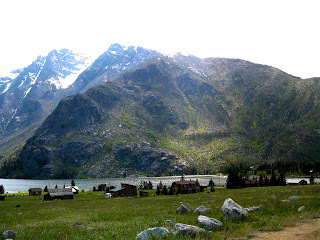 It is never okay to treat another human being as an object. For any reason. Ever.
It is never okay to treat another human being as an object. For any reason. Ever.Men are taught to be rugged individuals. We are taught to think, take charge, and make decisions, even if we don’t know what’s going on or understand what needs to be done.
Men are not taught the way of the heart. We are not taught how to be part of a community where ideas and insights are shared. We are not taught to respect each other. We’re taught to genuflect to power.
This is a generalization, of course. Not all men act like this.
There are many men with good and loving hearts. There are men who will stop what they are doing to help others. There are men who listen to the insights of others, who work together, men who are not afraid to learn or show their emotions, men who seek to do what is right even if it doesn’t benefit them.
The posts at the @Good Men Project are helping men learn to become better dads, husbands, and humans.
We do not create community through leverage. Cooperating with others is not a dirty word. Our community is strongest when we treat each other as equals.
It is never okay to treat another human being as an object. For any reason. Ever.
No man is an island, entire unto himself.
Published on October 18, 2016 18:33
October 16, 2016
Brother Sun, Sister Moon
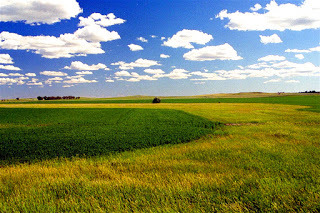 The feast day of Francis of Assisi was earlier this month. Clare’s feast day is in August. In this harvest season, as I drive through the countryside past fields of soybeans and corn, I think of Clare and Francis and their great love for nature and their mutual respect for each other. They were equal partners, even though Francis gets most of the press.I see them running through the meadows of their scenic Umbrian countryside, robes flapping around them as they shout words of joy to each other, praising the glorious flowers, singing birds, and the glowing fields of wheat. In what would come to be known as his Canticle of the Creatures, Francis speaks of the beauty and presence of the natural world and all its creatures. He gives thanks for his steady companions, brother Sun and sister Moon.
The feast day of Francis of Assisi was earlier this month. Clare’s feast day is in August. In this harvest season, as I drive through the countryside past fields of soybeans and corn, I think of Clare and Francis and their great love for nature and their mutual respect for each other. They were equal partners, even though Francis gets most of the press.I see them running through the meadows of their scenic Umbrian countryside, robes flapping around them as they shout words of joy to each other, praising the glorious flowers, singing birds, and the glowing fields of wheat. In what would come to be known as his Canticle of the Creatures, Francis speaks of the beauty and presence of the natural world and all its creatures. He gives thanks for his steady companions, brother Sun and sister Moon.For years, Francis and Clare have been my sun and moon. In the background, I hear Donovan singing during this scene in the 1972 Zeffirelli movie. That’s neither here nor there, but why does life seem richer when there’s a soundtrack? Except that Francis began this poem not when he was out in the fields being inspired by nature. The words came when he was seriously ill and lying in bed. How was he able to sing praises of joy when he felt so miserable that he couldn't get up? When I’m sick, praise is the last thing on my mind. I am truly a horrible patient.
Already exiled from his home and family, after days of being cold and shivering in a small hut built by Clare and her sisters, perhaps the words began to come into his consciousness when a single ray of sunshine warmed his skin, like the comforting touch of Clare, and as when a friend comes and sits with us to keep us company.
Rather than complain about his suffering, he celebrated this simple pleasure, gave thanks, and looked forward to when he could share again the beauty of Creation with Clare. I wouldn’t be surprised if Clare contributed half of the words.
Published on October 16, 2016 05:57
July 10, 2016
Solace of Nature and Grief
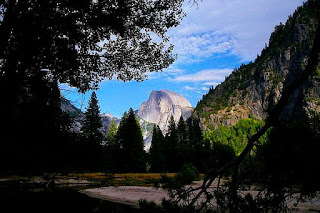 When grief knots me up, I head for nature. Breathing the fresh air of the mountains pulls me out of my funk.
When grief knots me up, I head for nature. Breathing the fresh air of the mountains pulls me out of my funk.Nature demands nothing of me. It accepts me as I am.
Nature goes about its life and provides openings for me to participate as I want. I can sit beside a river for hours and let the sounds of the undulating water soothe my sorrow. I can wander in the forest’s cool shadows when the heat and brightness of the sun become too much. Or I can tromp across a mountain and physically work out my anger and frustrations.
When I met Evelyn, I had one other great love — Yosemite. When she died, I thought I had lost Yosemite, too, because the first time back, six weeks after her death, the trip was a disaster. For twenty years, Yosemite had never failed to inspire me with awe as soon as I entered the valley — iconic Half Dome, snow-capped mountains, green meadows, and waterfalls flowing down around the valley.
It was natural to return when Evelyn died, but that first time back, I ran into our happy memories of being there together. They burned like bonfires, reminding me who was missing. I ended up leaving early because it was too hard to be there.
On the morning I left, I went down to the river before dawn. The valley was still black. As the rising sun peeked over the mountains, it sent a beam of light into the dark forest in front of me and lit up a grove of green aspen across the river. I could see that it was amazing, but I couldn’t feel anything. I knew that I needed to remember this so I took a photograph.
The message I sensed was that I was going to be okay, but I had to be patient and wait in grief’s darkness for the light to reach me. This photo would end up on the cover of my book, Mountains of Light, about hiking through nature to deal with grief.
When I returned to Yosemite later in the year, I was nervous. If I still couldn’t feel the beauty of the landscape, I would leave and never come back. Yosemite would be dead. But as I drove around the bend by Bridalveil Fall, El Capitan rose up to greet me.
That trip I hiked every day from sunrise to sunset. After the first hour on the trail, the chatter of surface thoughts calmed, and I became aware of feelings I hadn’t had time to face. Now I had ten hours on the trail to work through them. Scenic views frequently stopped me in amazement.
Because this was the wilderness, I paid attention to my surroundings. Bears and mountain lions lived here, and occasionally I’d hear something large moving in the forest or see its tracks. I was hiking alone, and the trail often traced the edge of a cliff. Once I was so wrapped up in my thoughts that I failed to notice the trail had turned and stepped over the edge. I was able to stop my slide by grabbing on to bushes.
As I watched nature carefully, I saw how it dealt with grief — nature mourns its deaths for a moment, and then moves on. I also noticed that nature was constantly changing, even mountains made of granite. Rockslides continue to come down and bury trails and animal habitats. Mirror Lake fills in with sediment brought down by the river and becomes a meadow. Each spring the river floods and adjusts its course.
Our lives are always changing, too, because people we love continue to die and take part of us with them. Each loss tears another piece out of the fabric of our universe. Being in nature allowed wonder to come back into my life.
In those early days when I felt battered by grief, hiking to the top of a mountain gave me a jolt of energy. Looking over hundreds of miles of wilderness, I felt connected to something more powerful than death.
No matter what happens to me now, I know that I can always return here and nature will be waiting to welcome me home.
Published on July 10, 2016 05:37



